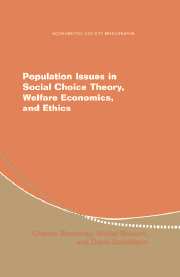Book contents
- Frontmatter
- 1 Introduction
- 2 Measurement of Individual Well-Being
- 3 Welfarist Social Evaluation
- 4 Fixed-Population Principles
- 5 Population Principles
- 6 Characterizations and Possibilities
- 7 Uncertainty and Incommensurabilities
- 8 Independence of the Existence of the Dead
- 9 Temporal Consistency
- 10 Choice Problems and Rationalizability
- 11 Applications
- References
- Author Index
- Subject Index
11 - Applications
Published online by Cambridge University Press: 05 January 2013
- Frontmatter
- 1 Introduction
- 2 Measurement of Individual Well-Being
- 3 Welfarist Social Evaluation
- 4 Fixed-Population Principles
- 5 Population Principles
- 6 Characterizations and Possibilities
- 7 Uncertainty and Incommensurabilities
- 8 Independence of the Existence of the Dead
- 9 Temporal Consistency
- 10 Choice Problems and Rationalizability
- 11 Applications
- References
- Author Index
- Subject Index
Summary
Part A
To illustrate the practical use of the critical-level utilitarian principles discussed in earlier chapters, we examine their use in two economic models. The first analyzes the problem of allocating a foreign-aid budget to different types of expenditures. In it, we assume that aid received by a developing country can be used to fund consumption or population control (prevention of births) and use a two-period model where population size in period two is determined by the amount spent on population control in period one. The second application examines the use of animals in research and food production. We evaluate various policies with a generalization of critical-level utilitarianism that takes account of the interests of non-human sentient animals and allows critical levels to differ across species. In both applications, population size is treated as a continuous variable to simplify the analysis.
FOREIGN AID AND POPULATION POLICY
Population policy is replete with ethical difficulties (Sen 1994, 1995) and policy decisions are complicated by imperfect knowledge of the effectiveness of policy options. Should we rely, for example, on the free choices of potential parents, improved education, or (possibly coercive) family-planning programs? These conundrums are made worse if there is disagreement about the ethical standards that should be used to evaluate possible outcomes. If policies are evaluated using average utilitarianism, for example, the result will be smaller populations than those recommended by classical utilitarianism.
- Type
- Chapter
- Information
- Publisher: Cambridge University PressPrint publication year: 2005

